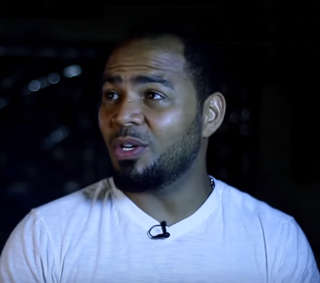
Ramsey Nouah is a Nigerian actor and director. He won the Africa Movie Academy Award for Best Actor in a Leading Role in 2010 for his performance in the movie The Figurine. He made his directorial debut with the film Living in Bondage: Breaking Free in 2019 and also went on to direct Nollywood classic Rattle Snake: The Ahanna Story which is a remake of Rattlesnake (1995).
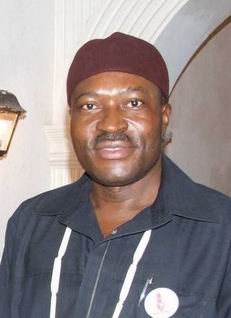
Anayo Modestus Onyekwere popularly known as Kanayo O. Kanayo is a Nigerian actor and lawyer. In 2006, He won the Africa Movie Academy Award for Best Actor in a Leading Role for his performance in the movie Family Battle.

The Africa Movie Academy Awards, popularly known as AMAA and The AMA Awards, are presented annually to recognize excellence among professionals working in, or non-African professionals who have contributed to, the African film industry. It was founded by Peace Anyiam-Osigwe and is run through the Africa Film Academy. The awards are aimed at honouring and promoting excellence in the African movie industry as well as uniting the African continent through arts and culture.
The 5th Africa Movie Academy Awards ceremony was held on April 4, 2009, at the Gloryland Cultural Center in Yenagoa, Bayelsa State, Nigeria, to honor the best African films of 2008. It was broadcast live on Nigerian national television. Africa Movie Academy Award winner Kate Henshaw-Nuttal and Nigerian stand-up comedian Julius Agwu hosted the ceremony. Numerous celebrities graced the event, including Timipre Sylva and Nollywood actresses and actors. Special guests were Academy Award winner Forest Whitaker and Hollywood actor Danny Glover.
The 4th Africa Movie Academy Awards ceremony was held on the 26th of April 2008 at the Transcorp Hilton Hotel, Abuja, Nigeria, to honor the best African films of 2007. The ceremony was broadcast live on Nigerian national television. The special guest of honor at the event was Hollywood actress Angela Bassett.
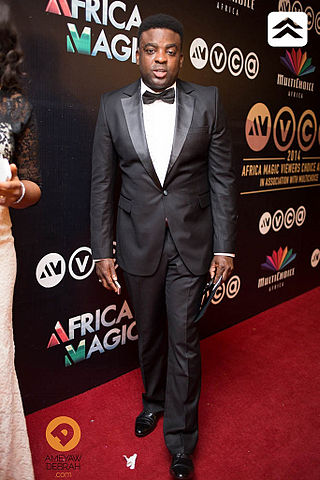
Kunle Afolayan is a Nigerian actor, producer, and director. He is credited for elevating the quality of Nollywood movies through larger budgets, shooting on 35mm, releasing in cinemas, and improving cliché Nollywood storylines. After starting his film career as an actor in the 1999 political drama Saworoide, Afolayan made his directorial debut in 2006 with Irapada, a Nigerian supernatural thriller, which won the Africa Movie Academy Award for Best Film in an African Language. His subsequent directing credits include The Figurine, Phone Swap, October 1, and Citation.

The Figurine: Araromire is a 2009 Nigerian supernatural suspense thriller film written by Kemi Adesoye, produced and directed by Kunle Afolayan, who also stars in the film as one of the main protagonists. It also stars Ramsey Nouah and Omoni Oboli.
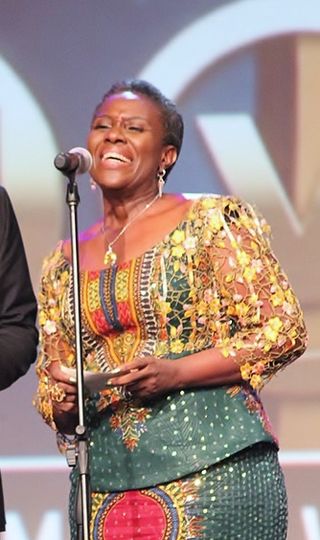
Joke SilvaMFR is a veteran Nigerian actress, director, and businesswoman.
![<i>Phone Swap</i> Film dir. by Kunle Afolayan ; starring Joke Silva ... [et al.]](https://upload.wikimedia.org/wikipedia/en/a/af/Phone_Swap_Theatrical_Poster.jpg)
Phone Swap is a 2012 Nigerian romance comedy-drama film written by Kemi Adesoye, directed and produced by Kunle Afolayan. It stars Nse Ikpe Etim, Wale Ojo, Joke Silva, Chika Okpala, Lydia Forson and Afeez Oyetoro, and focuses on a series of events unfolding when two polar opposites accidentally exchange phones. The film was conceived after a brief from an advertising agency to create a movie that would cut across ages 15 to 45. It received 4 nominations at the 8th Africa Movie Academy Awards which includes the category Best Nigerian Film and won the award Achievement in Production Design.
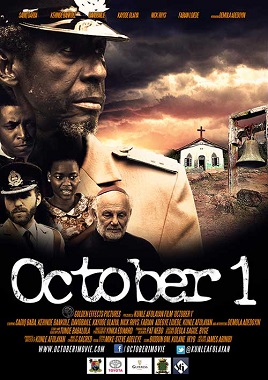
October 1 is a 2014 Nigerian thriller film written by Tunde Babalola, produced and directed by Kunle Afolayan, and starring Sadiq Daba, Kayode Olaiya, and Demola Adedoyin. The film is set in the last months of Colonial Nigeria in 1960. It recounts the fictional story of Danladi Waziri (Daba), a police officer from Northern Nigeria, investigating a series of killings of young women in the remote Western Nigeria village of Akote just before 1 October 1960 – the date Nigeria gained independence from British colonial rule.
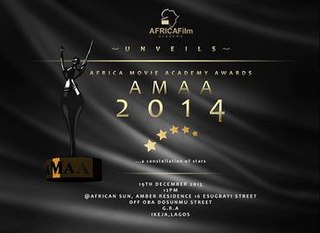
The 10th Africa Movie Academy Awards ceremony honouring movies of 2013 was scheduled to take place in Yenagoa, Bayelsa State on 26 April 2014, but was shifted to 24 May 2014. The nomination party was held at Emperor Palace, Johannesburg, South Africa on 2 April 2014.

Dazzling Mirage is a 2014 Nigerian drama film, produced and directed by Tunde Kelani; it stars Kemi "Lala" Akindoju, Kunle Afolayan, Bimbo Manuel, Yomi Fash Lanso, Taiwo Ajai-Lycett and Seun Akindele. It also features special appearances from Adewale Ayuba, Sean Tizzle, Tunde Babalola and Steve Sodiya. The film is an adaptation of a novel of the same name by Olayinka Abimbola Egbokhare, adapted to screen by Ade Solanke. It tells the story of a young sickle-cell patient and the various social and emotional challenges she is faced with.

Maami is a 2011 Nigerian drama film produced and directed by Tunde Kelani. It is based on a novel of the same name, written by Femi Osofisan, and adapted to screen by Tunde Babalola. It stars Funke Akindele as Maami, along with Wole Ojo and Olumide Bakare. Though the film was a commercial failure, it was generally met with positive critical reviews.
Irapada is a 2006 Nigerian supernatural thriller film, produced and directed by Kunle Afolayan. In 2007 It won the Africa Movie Academy Award for Best Film in an African Language. It was also featured as one of the Must See African Films of the 21st century on CNN African Voices in 2013. It was released on DVD in July 2008.
Kabirah Kafidipe is a Nigerian film actress, director and producer. She is popularly known as “Araparegangan” for her role in Saworoide, a 1999 Nigerian film produced and directed by Tunde Kelani.
Mahmood Ali-Balogun is a Nigerian filmmaker, cultural worker and the managing director of Brickwall Communications Limited. He directed the multiple award-winning film 'Tango With Me'. He is the Chairman of the Audio Visual Rights Society (AVRS) of Nigeria (2).

New Nigerian Cinema or New Nigerian Cinema era is an emerging phase in Nigerian cinema, in which there became a major shift in the method of film production, from the video format, which came about during the video boom, back to the cinema method, which constituted the films produced in the Golden era of Nigerian cinema history. The films in the New Wave are specifically characterized by improved narrative complexity, aesthetic nuance, much higher budgets and advanced overall production values, when compared to video films from the second generation of filmmakers. They are mostly released theatrically, although some are still released directly on DVD.

Nollywood, a portmanteau of Nigeria and Hollywood, is a sobriquet that originally referred to the Nigerian film industry. The origin of the term goes back to the early 2000s, traced to an article in The New York Times. Due to the history of evolving meanings and contexts, there is no clear or agreed-upon definition for the term, which has made it a subject of several controversies.
Peace Anyiam-Osigwe MFR was a Nigerian filmmaker and entertainment executive who was called "the queen of Nollywood films". She was the founder of globally acclaimed film ceremony, Africa Movie Academy Awards. The Guardian documents that she pioneered the screening of Nollywood films at international film festivals. She directed the first music video of hip-hop sensation, P-Square. In 2012, she was bestowed a Member of the Order of the Federal Republic by the Nigerian government for her contribution to the entertainment industry. She was also a TED fellow.

Ayinla is a 2021 musical eponymous film based on the life of Ayinla Yusuf popularly known as Ayinla Omowura, an Apala musician who was stabbed to death by his manager named Bayewu in a bar fight on 6 May 1980 at Abeokuta. The film premiered on 13 June 2021 in Lagos and was released to theatres on 18 June 2021. Directed by Tunde Kelani, the film was set in the 1970s and early 1980s and shot in Abeokuta, Ogun State. Lateef Adedimeji assumed the role of Ayinla, starring alongside Omowumi Dada, Bimbo Manuel, Ade Laoye, Kunle Afolayan, Bimbo Ademoye and Mr Macaroni. Ayinla is Kelani's first major film since his 2015 release of Dazzling Mirage. The budget for this feature film is officially given as ₦50 Million.







![<i>Phone Swap</i> Film dir. by Kunle Afolayan ; starring Joke Silva ... [et al.]](https://upload.wikimedia.org/wikipedia/en/a/af/Phone_Swap_Theatrical_Poster.jpg)





